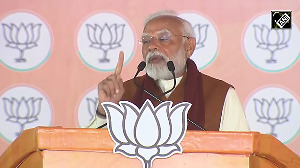American Congressman Edward Markey isn't the only one incensed with the India-US nuclear deal.
Leonard Weiss, former staff director of the US Senate Committee on Governmental Affairs and a key architect of the 1978 Nuclear Non Proliferation Act, has said the deal "whitewashes, via silence, India's past transgressions in violating bilateral agreements with the United States and Canada, and it puts the United States in arguable violation of its own commitments to the NPT (nuclear Non Proliferation Treaty)."
Weiss told Rediff India Abroad that "a politically weakened American president, buffeted by charges of failure and incompetence in the management of both domestic and foreign policy, was unable to stand up to Indian demands on the most important part of the negotiations -- how the separation of Indian facilities into civilian and military spheres could be effected."
Weiss complained that "the failure to subject India's (fast) breeder program and ancillary facilities to IAEA (International Atomic Energy Agency) safeguards enables India to have a substantial increase in its nuclear weapons production."
He also raised the spectre of the breeder program also being "a prime target for terrorists seeking to steal nuclear material."
"The fact that 14 out of 22 (of India's) operating reactors will be safeguarded is less important from a non-proliferation perspective than the green light given to Indian increases in weapon production. Increases which will also be facilitated by the sale of nuclear fuel for safeguarded reactors, thereby releasing all of India's indigenous uranium production for its weapons program," Weiss continued.
"The announcement makes no mention of the spent fuel discharged from India's un-safeguarded reactors that contain up to 9 tonnes of plutonium that will now presumably be part of the weapons program," Weiss said.
"And there is no limit on India's building future breeders for the purpose of making weapons," he fumed.
Admitting that the agreement "is a victory for the nuclear bureaucracies in India, the United States and potential nuclear suppliers everywhere," Weiss said, "It is not a victory for Indian consumers of energy. There is no reason to believe that nuclear cooperation with India will make nuclear energy more competitive in India than other energy sources, especially renewable energy sources."
He argued that "every rupee spent on nuclear energy base load capacity in India -- which suffers mightily from one of the most inefficient energy supply and distribution systems in the world -- is a rupee that could have brought much more energy relief to consumers, had it been spent on end-use efficiency or hydro or any one of a number of other alternative sources that are cheaper than nuclear (energy)."
Weiss said he had no problems with the goal of improving bilateral relations with India and asserted that he applauded these efforts, particularly since India is "a democracy and emerging world power with whom we have much in common."
"(But) It is unfortunate that the wrong path to this worthy goal has been taken with this nuclear agreement," he added.
Also see
'Bush's difficulties with N-deal lie at home'
India, Pak not NPT violators'
Won't give uranium to India: Australia
US offers advanced fighter aircraft to India
Complete Coverage






 © 2025
© 2025